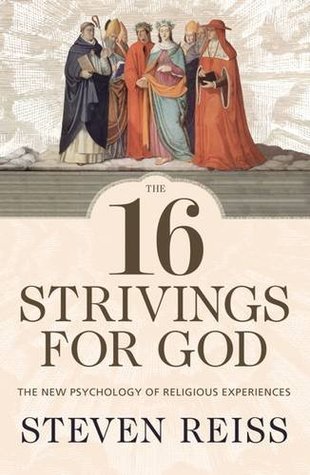
16 Strivings for God: The New Psychology of Religious Experiences, Steven Reiss. Macon: Mercer University Press, 2015.
Summary: A new psychology of religious experience that argues that religions enjoy such a wide embrace because they offer repeated opportunities to satisfy sixteen basic motivations or “strivings” common to all human beings.
St. Augustine of Hippo in The Confessions wrote, “Thou has made us for thyself, O Lord, and our heart is restless until it finds its rest in thee.” Steven Reiss, a psychologist whose most recent work has been in the area of motivation, argues that this striving, restless heart, expressed in a multi-faceted variety of ways, is the basis for the continuing appeal of religion and indeed that any major religion worth its salt appeals to all of sixteen strivings or motivations.
This contention is rooted in Reiss’s work in motivation theory. Through a series of large scale surveys, Reiss and his associates discovered sixteen basic desires that he would argue are common to all human beings. Individuals have their own pattern of strong and weak desires, the interplay of which is important for self-understanding. The Reiss Motivation Profile ® is a standardized assessment and is best understood with the assistance of a qualified coach.
In this book, he brings that research to bear in proposing a new psychology of religious experience based not on a single factor such as those of Tylor, Fraser, Freud, James, or others, but a multiple set of factors unique to each person that also may be predictive of the features in a religion which will most resonate with that person. People embrace religion on the basis of their particular pattern of strivings.
Reiss, while touching on teachings of all the major religions at various points, seems most familiar with Judeo-Christianity. He contends in one chapter that the Judeo-Christian idea of God reflects the ultimate expression of thirteen of the sixteen strivings (excluding romance, eating, and saving, although I might see ways to include even these!). What I most appreciated about Reiss is that he does not see this, unlike Feuerbach or Freud, as a support for atheism. He leaves the theological question of God’s existence open, but observes that, “If our concept of God did not express our deepest desires and needs, he would be meaningless to us” (p. 57).
Reiss then applies these ideas to discussions of what motivates asceticism and mysticism. He proposes an ascetic profile in which persons have strong desires for honor, and low desire for eating, social contact, family, romance, status, and tranquility. He would characterize the mystic as gentle, humble, visionary, unambitious, and aesthetic.
The longest chapter, chapter 7 explores the contradictions of human nature and how both strong and weak desires of each of the sixteen strivings are addressed in religious experience. Here again, he focuses most on the Judeo-Christian tradition, including numerous quotes from the Christian scriptures. In so doing, he demonstrates the explanatory power of his theory of religious experience.
I do find his argument persuasive overall, although I also wonder about the falsifiability of his theory. His thesis resonates well with the argument Jamie Smith has made recently in Desiring the Kingdom, that we are “desiring agents”, that we are what we love. Reiss touches on how we may sometimes be drawn to aspects of a religion that address a desire that one perceives too weak or strong (for example, the practices of fasting that may address gluttony). Yet Reiss also sees motivational patterns as relatively immutable. One of the contentions of Christian formational practices is that our encounters with God through practices and liturgies may “re-order” desires that are inordinately weak or strong. These two ideas seem in tension and I would be curious how Reiss would address this.
My sense in reading this book was one of listening to a sympathetic observer giving his observations of the faith in which I dwell. It is interesting to consider why particular things about the Christian faith, such as bringing together the love of God and the life of the mind, that are so much a part of my life and I think are intrinsic to faith also may be reflective of the particular mix of desires and motivations that make me who I am. It seems this can serve as a tool for understanding why others differ from us and yet identify with the same faith and might be a helpful tool for understanding across our differences within our religious communities.
Editor’s Note: Thank-you to Bob Trube for sharing his reviews with Emerging Scholars! Bob first posted the above review on Bob on Books. For your reflection (possibly even a bridge to conversation) as you wrap up the academic year, engage the holidays, and begin a new year. To God be the glory! ~ Thomas B. Grosh IV, Associate Director, Emerging Scholars Network
Bob Trube is Associate Director of Faculty Ministry and Director of the Emerging Scholars Network. He blogs on books regularly at bobonbooks.com. He resides in Columbus, Ohio, with Marilyn and enjoys reading, gardening, choral singing, and plein air painting.

Leave a Reply